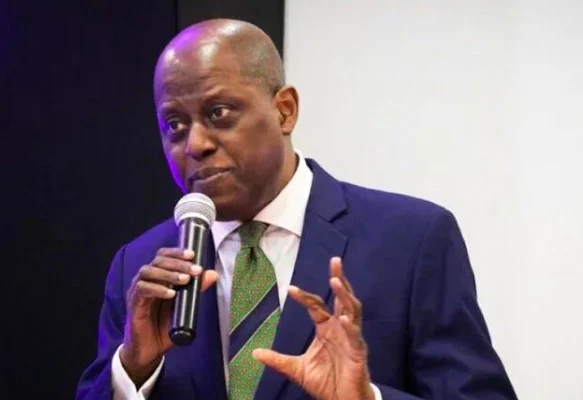By Tony Obiechina, Abuja
The senate recently confirmed the appointments a new leadership at the Central Bank of Nigeria (CBN), comprising the Governor, Mr Olayemi Cardoso and four Deputy Governors.
This followed their nominations to the Upper Chambers of the National Assembly by President Bola Ahmed Tinubu for consideration for appointments.
The new CBN Governor and his team have since swung into action to turn around the dwindling fortunes of the Apex Bank which the President in his inaugural address
stressed the urgent need to “clean up the CBN and its Monetary Policies”.
As a first step to this task, a special investigator appointed to look into the affairs of the CBN is currently at work. Further to the clean-up exercise, the President deemed it necessary to bring in new leadership to the helm of affairs at the Central Bank.
According to a document obtained from the CBN, the new Governor has mapped out strategies where he enumerated the preliminary challenges confronting the Bank and how he intends address them.
“I shall outline the challenges facing the Central Bank, introduce high-level proposals to address reformation challenges and discuss the role of a refocused Central Bank in supporting the economic agenda of the President Tinubu Administration.
What are the current challenges facing the Central Bank of Nigeria? In assessing these challenges, preliminary questions are being raised on addressing them.
Failure in corporate governance in CBN:
How will issues of governance be addressed?
Diminished institutional autonomy:
How can public and financial systems’ stakeholder confidence be restored in the autonomy and integrity of CBN?
Need to refocus CBN back to core functions:
What needs to be in place to revert to evidence-based Monetary policies?
Discontinuation of unorthodox Monetary policies and Foreign Currency management?
Unorthodox use of Ways and Means spending:
What controls can CBN develop to enforce statutory limits in the use of Ways and Means of financing public sector deficit?
Backlog of FX demand:
How much of the backlog is real versus speculative/ hoarding?
Are there creative financing options for clearing the short to medium term backlog?
Lack of clarity in fiscal and monetary relationships – where are the delineations, and what should be the limits in CBN’s fiscal side interventions?
Inflation and price stability:
What are the causes, and what is CBN’s proposed response to address inflation and price stability issues?
Access to FX market and FX price discovery:
What mechanisms exist to address FX rate unification under a willing buyer and willing seller arrangement?
What should be the role of the Central Bank in the FX market?
Is there a need for interest rate realignment to money supply, inflation, and market realities?
Current Financial System Stability:
What is the current state of the financial system?
Are CBN surveillance frameworks being updated proactively to track the expanding use of electronic payment systems by Fintech and Telcos?
These problem statements need in-depth review by the new Central Bank leadership team to determine what mechanisms are currently working, what can be tweaked or dispensed with and what new tools need to be introduced.
How a refocused CBN can support economic growth.
Size Matters
The economic policy proposals of the Administration identify a set of fiscal reforms and growth targets that will achieve $1.0 TN GDP within eight years. In reviewing selected BRICS and MINT countries, with large populations and similar developmental characteristics as Nigeria, it is interesting to identify macro-economic indices that point to Nigeria’s economic trajectory, given the faithful implementation of the proposed economic reforms. In economies bigger than $1.0TN, these indicators include moderate inflation, sizable foreign reserves, and the capacity to quickly rebound from a cyclical economic downturn.
Advisory role of CBN
Much has been made of past CBN forays into development financing, such that the lines between monetary policy and fiscal intervention have blurred. In refocusing the CBN to its core mandate, there is a need to pull the CBN back from direct development finance interventions into more limited advisory roles that support economic growth. These advisory roles could include, for instance:
Act as a catalyst in the propagation of specialised institutions and financial products that support emerging sectors of the economy.
Facilitate new regulatory frameworks to unlock dormant capital in land and property holdings.
Accelerate access to consumer credit and expand financial inclusion to the masses.
De-risking instrumentation to increase private sector investment in housing, textiles and clothing, food supply chain, healthcare, and educational supplies. These verticals have huge demand patterns, with the potential for high local inputs and value retention, and can be the basis for rapid industrialisation.
Exercise CBN’s convening power to bring key multilateral and international stakeholder participation in government and private sector initiatives.
Conclusion
It must be emphasised that CBN does not have a magic wand that can be waved at the current economic challenges. The problems facing the bank are large and complex. However, with focused leadership and sustained reforms, it is expected that over time, the country will see gains open economic spaces, attract new investments, create employment, and give our hardworking and talented compatriots opportunity for a more prosperous future”. READ ALSO:
- Nigeria: Is Egalitarian Society A Mirage In Our Clime?
- NSC appoints Yusuf Ali CEO Elite Athletes Development Board
- NCC approves 50% tariff adjustments for telecom operators
- Donald Trump sworn in as United States President
- BREAKING: Trump takes oath, begins 2nd term as U.S. President


